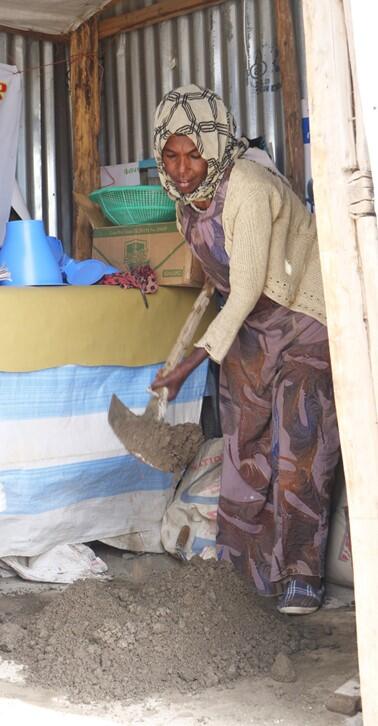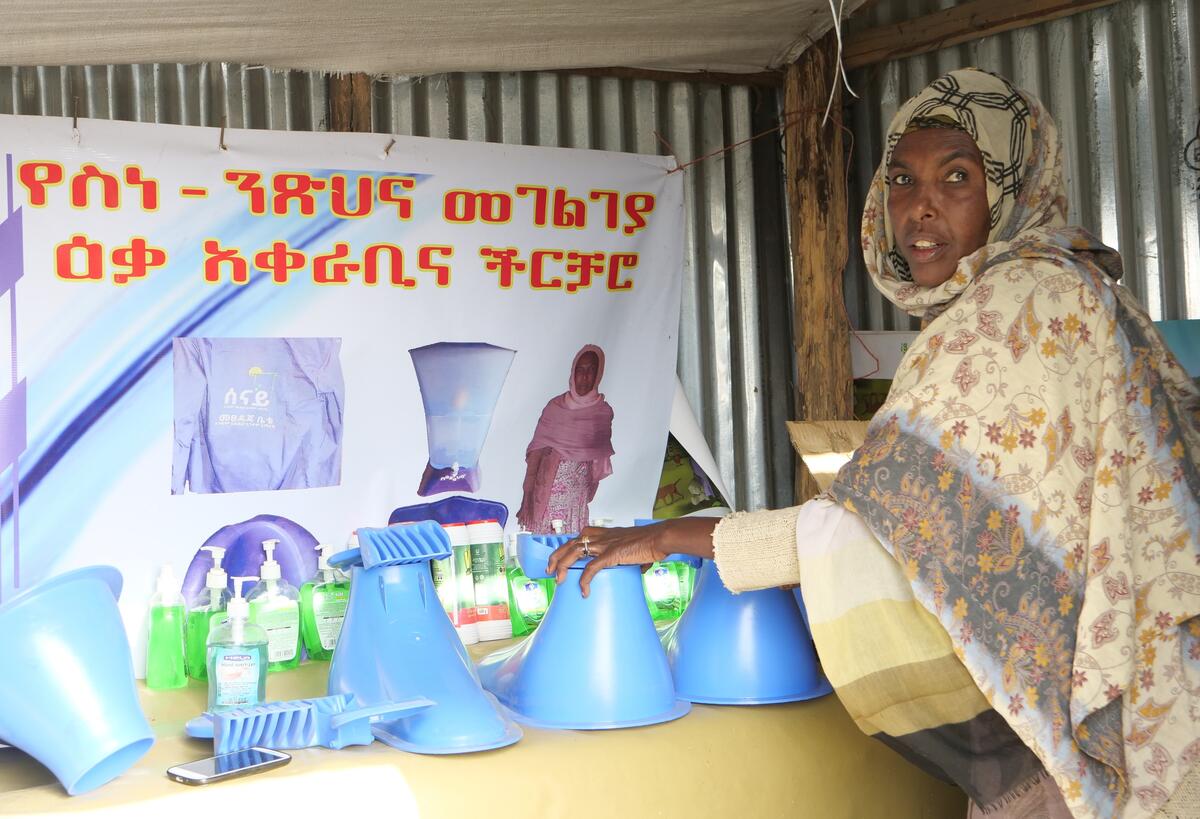
This is the story of Yeshi, an Ethiopian woman who became a successful sanitation entrepreneur.
Published on: 21/02/2023
A Success Story from USAID Transform WASH
Written by: Tsegaye Yeshiwas, Bret McSpadden, Nazrawit Ashenafi, and Meseret Desalegn
| Ethiopia at a glance • 91%, or 104 million people, without access to a basic sanitation facility (JMP 2020) • 30 to 40,000 deaths of children under five due to diarrhoea (Ministry of Health) |
Yeshi's hands are strong enough to mix cement and sand with a shovel then construct a toilet slab fitted with a SATO pan. She also runs a shop, and when clients show up, she drops what she’s doing to sell products before returning to her slab construction work. When a household comes to Yeshi with a question, she visits them to give advice on how to improve their toilet. She is an entrepreneur and a strong advocate for better sanitation in her neighbourhood.

Yeshi in her shop Photo: Tsegaye Yeshiwas
Yeshi Aragie grew up in the Amhara region, Wore Illu woreda (district), Kabe kebele. She began working as a mason/installer there two years ago, following the training that she received from USAID Transform WASH in partnership with Woizero Sihin Polytechnic College. The training covered the marketing of sanitation products and construction and installation of simple latrines. Kebele officials who support women entrepreneurs invited Yeshi to the training because they saw that she was a quick learner and had success in building and selling small-scale concrete cookstoves. This hands-on training, in which students practised improving a poorly constructed toilet within the college, allowed Yeshi to understand the value of upgrading toilets in preventing the spread of infectious diseases and fostering healthy households. She constructed her own toilet after completing the training and demonstrated to her neighbours how easy her refurbished toilet was to clean, free of odours. Immediately, a few neighbours asked her to help them upgrade their toilets.
"It is not just only about the profit that I make but also about the service that I provide to my community."
- Yeshi Aragie
Yeshi struggled as she began this work and had to confront community stereotypes and negative perceptions about women working in sanitation and construction, which is often done by men and seen as men's work. When some passers-by noticed her, they covered their noses and moved away because they believed that she was in contact with human waste. Instead of being discouraged, Yeshi used this as an opportunity to teach the community about her work. When various meetings took place in the kebele, she attended and demonstrated the sanitary gloves she used to maintain her own hygiene. Over time the community embraced what she taught and demanded more and more of her services.
Yeshi has also opened a shop where she sells sanitation supplies. Transform WASH has helped connect her to product suppliers in Dessie town who, seeing the demand Yeshi has created for her products, are willing to provide products on consignment. She has created a one-stop shop for a range of WASH products, such as plastic and cement slabs, handwashing stations, water filters, and water treatment products, among other items. She is looking to expand her operations and is hoping the kebele will provide her with access to a larger workspace for her business. To date, she has sold more than 600 SATO pans and has trained her nephew to help produce concrete slabs.
Since her initial training, Yeshi has participated in additional marketing and business training sessions provided by USAID Transform WASH, which has helped her improve her enterprise by understanding and applying the best approaches and methods for attracting and managing customers. The business training included methods of recording her daily activities through use of books that track how many individuals she reaches with door-to-door visits and how many sanitation products she has sold. The training also helped her work with sales agents, who Yeshi pays a sales commission. When Yeshi, her sales agent, or one of the kebele's health extension workers visits a household, they use a visual aid, a short photo book, that she received from Transform WASH to help discuss their sanitation-related problems and the positive impact of unimproved latrines on a family's health and living environment.
Yeshi's business revenue has enabled her to educate her children and live her life without much financial concern. She describes this as a huge relief and said that, now that five have finished school and are employed themselves, she can focus on expanding her business even more.
"The toilets she builds are really good quality, and there is no one else in the kebele who builds quality toilets like she does."
– Tefera Mengesha, customer
Yeshi’s neighbours describe her as a role model in the kebele for her efforts to promote sanitation and hygiene. They recognize her close collaboration with and knowledge transfer to local health extension workers and other professionals, her tenacity in educating community members, and her work to break down gender stereotypes in the construction sector and in society at large. The kebele’s health centre believes that Yeshi’s business is contributing to a reduction in their disease burden. One of her neighbours, Tefera Mengesha, said, “The toilets she builds are really good quality, and there is no one else in the kebele who builds quality toilets like she does.”
Yeshi is one of more than 450 active and engaged Transform WASH business partners who have contributed to nearly 130,000 households moving up the sanitation ladder. Women-owned businesses make up only 17 percent of all partners, but successes like Yeshi’s show that women have a place in the sanitation market, can be successful, and break down gender barriers in the sector. Beyond individual success and economic development, targets for sanitation cannot be met through government-led efforts alone and Transform WASH has shown that market-based sanitation is a viable and essential method for improving sanitation that needs support and encouragement from government, NGOs, and the private sector.
Yeshi intends to acquire a larger working area to produce and sell more toilet improvement solutions "It is not just about the profit that I make,” she said, “but about the service that I provide to my community."
USAID Transform WASH aims to improve water, sanitation and hygiene (WASH) outcomes in Ethiopia by increasing market access to and sustained use of a broader spectrum of affordable WASH products and services, with a substantial focus on sanitation. Transform WASH achieves this by transforming the market for low-cost quality WASH products and services: stimulating demand at the community level, strengthening supply chains, and improving the enabling environment for a vibrant private market.
USAID Transform WASH is a USAID-funded activity implemented by PSI in collaboration with SNV, Plan International, and IRC WASH. The consortium is working closely with government agencies, including the Ministry of Health, the Ministry of Water, Irrigation and Electricity, the One WASH National Programme, and regional and sub-regional governments.
At IRC we have strong opinions and we value honest and frank discussion, so you won't be surprised to hear that not all the opinions on this site represent our official policy.